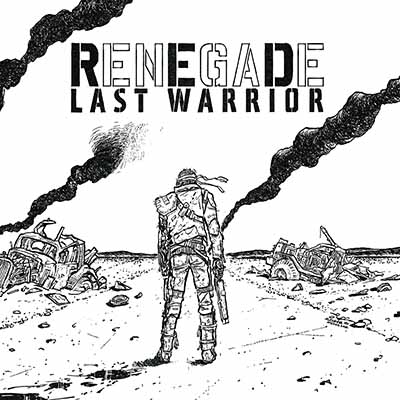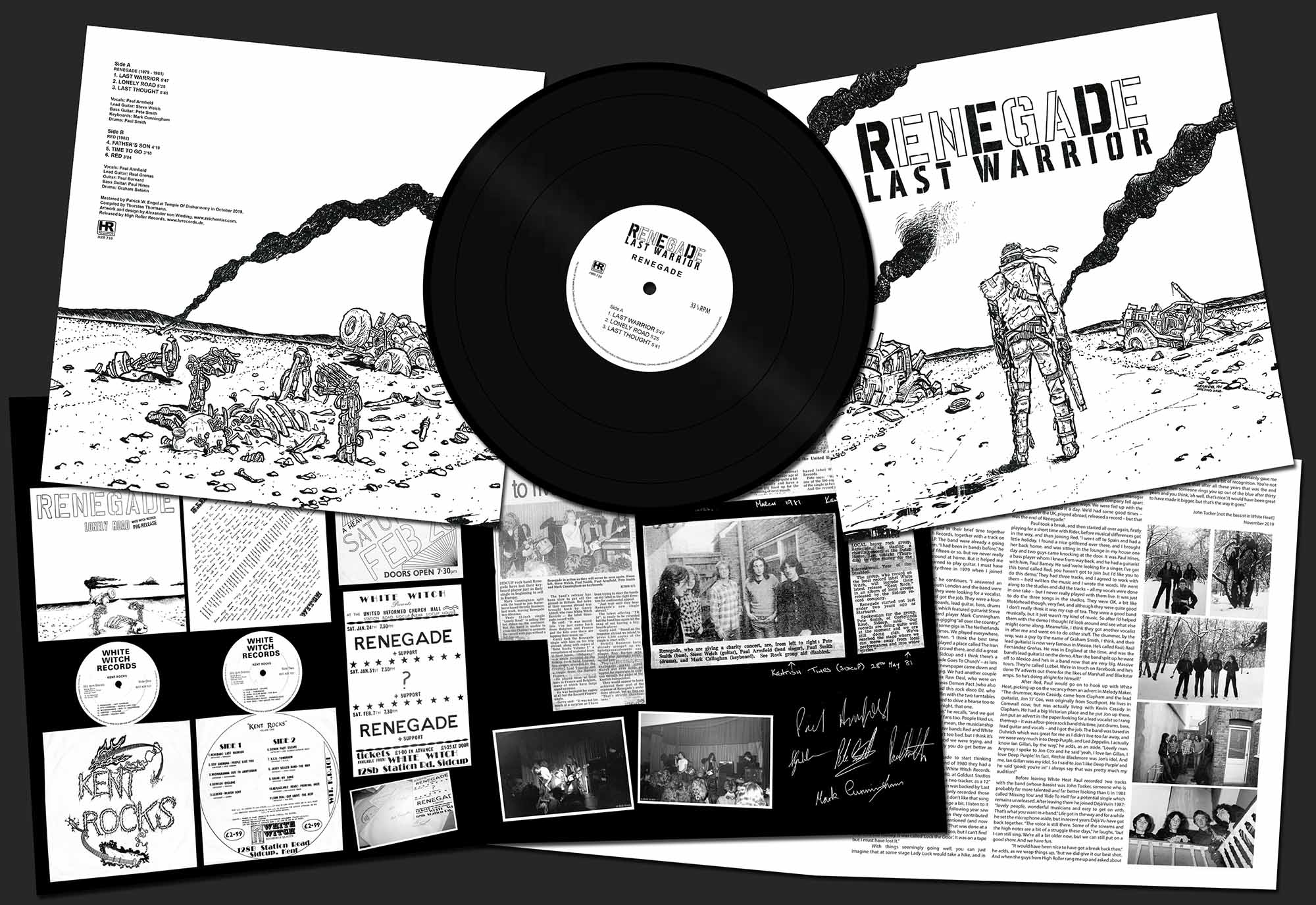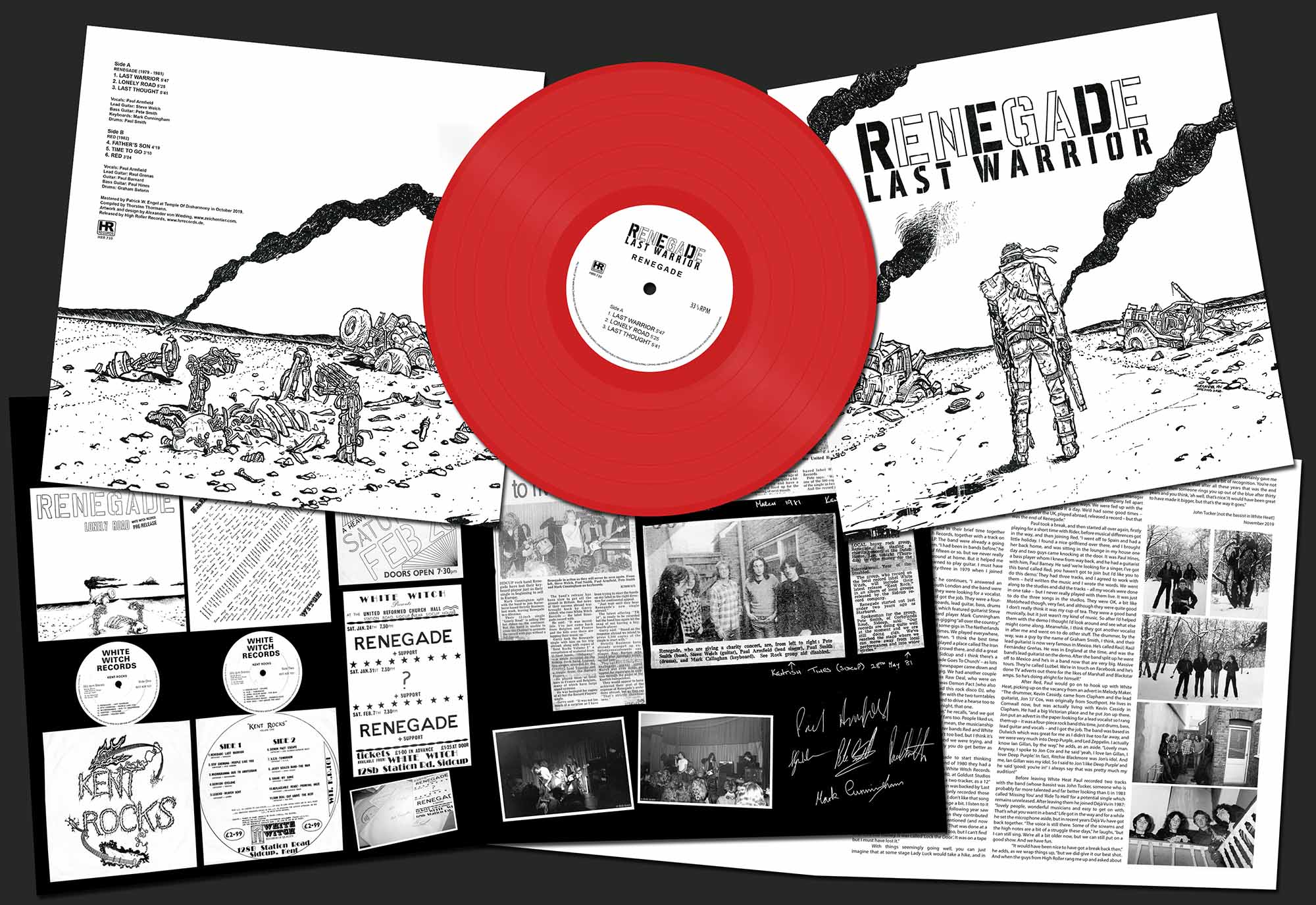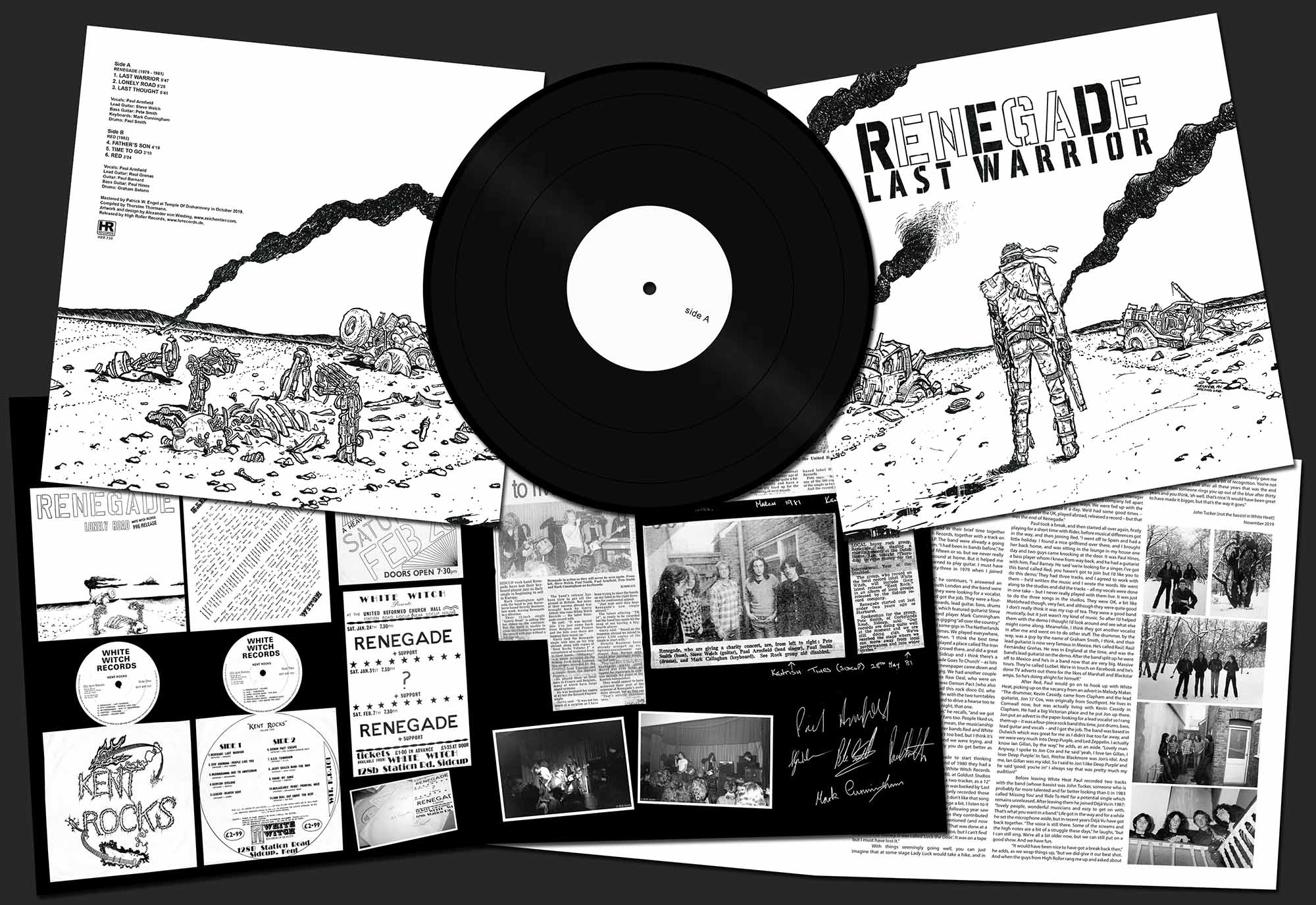 | ||||
| RENEGADE / RED - Last Warrior MLP | |
HRR 739LP, ltd 300, 200 x black + 100 x opaque red vinyl, 4 page insert | |
| Vocals: Paul Armfield Lead Guitar: Steve Welch Bass Guitar: Pete Smith Keyboards: Mark Cunningham Drums: Paul Smith | Vocals: Paul Armfield Lead Guitar: Raul Grenas Guitar: Paul Barnard Bass Guitar: Paul Hines Drums: Graham Baterin |
| RENEGADE (1979 - 1981) 1. Last Warrior 2. Lonely Road 3. Last Thought | RED (1982) 4. Father’s Son 5. Time to Go 6. Red |
AVAILABLE | |
Mastered by Patrick W. Engel at TEMPLE OF DISHARMONY in October 2019.
THE LAST WARRIOR
Vocalist Paul Armfield fronted a number of bands during the glory days of the New Wave Of British Heavy Metal, and in fact is still performing today with his band Déjà Vu. This release brings together the only known surviving recordings from his time with his first two serious bands, Renegade and Red.
Renegade date back to 1979 and in their brief time together issued a single on White Witch Records, together with a track on the label’s 1981 ‘Kent Rocks’ LP. The band were already a going concern when Paul joined them. “I had been in bands before,” he begins, “from about the age of fifteen or so, but we never really did any gigs: we just played around at home. But it helped me with my singing, and also I learned to play guitar. I must have been about twenty-two, twenty-three in 1979 when I joined Renegade.
“What happened was,” he continues, “I answered an advert in the paper – I’m from South London and the band were based in the Kent area – saying they were looking for a vocalist. So I made contact with them, and got the job. They were a four-piece band till I joined, with keyboards, lead guitar, bass, drums and then me on vocals.” The band, which featured guitarist Steve Welch, bassist Pete Smith, keyboard player Mark Cunningham and drummer Paul Smith were soon gigging “all over the country,” in Paul’s words, and even managed some gigs in The Netherlands and Belgium. “We had some great times. We played everywhere, we went abroad,” recalls the frontman. “I think the best time though, for me, would be when we played a place called The Iron Horse in Sidcup, and we had a good crowd there, and did a great gig. Then they hired this church in Sidcup and I think there’s a newspaper cutting about it – ‘Renegade Goes To Church’ – as lots of people packed out the church, the newspaper came down and saw us there and it was quite a fun gig. We had another couple of bands supporting us. I think it was Raw Deal, who were on ‘Kent Rocks’ too, and the other band was Demon Pact [who also appeared on that album">. And we had this rock disco DJ, who looked like Alice Cooper and had a coffin with the two turntables in it. He was great fun, and I think he used to drive a hearse too to carry his gear around. That was a great night, that one.
“There was quite a local scene,” he recalls, “and we got on with most bands. And we had lots of fans too. People liked us, and a lot of people followed us about. I mean, the musicianship wasn’t too bad although I think in my later bands Red and White Heat it was a lot better. Renegade weren’t too bad, but I think it’s a learning curve. We were only young and we were trying, and learning from our experiences. Obviously you do get better as you go along. Or you should,” he laughs.
It didn’t take long for Renegade to start thinking about putting a record out, and by the end of 1980 they had a single to their name, courtesy of Sidcup’s White Witch Records. ‘Lonely Road’ was recorded in October 1980, at Goldust Studios in Bromley (appearing, quite unusually for a two-tracker, as a 12” single), and the Armfield / Welch composition was backed by ‘Last Thought’. “We had loads of songs, but we only recorded those two, for some reason. ‘Last Thought’ though, I don’t like that song at all.” Another laugh. “When I hear it I do cringe a bit. I listen to it and think, ‘Christ! I’d like to delete that!’” The following year saw the band’s only other vinyl appearance, when they contributed the track ‘Last Warrior’ to the label’s aforementioned (and now highly sought after) ‘Kent Rocks’ compilation. “That was done at a separate session. We did record another song too, but I can’t find it for love nor money. It was called ‘Lock the Door’. It was on a tape but I must have lost it.”
With things seemingly going well, you can just imagine that at some stage Lady Luck would take a hike, and in Renegade’s case she took their manager with her. “The guy who was managing us went off into the sunset with all the money. He just disappeared,” says Paul. “That was awful, really, how that happened, and that was the end of Renegade. I think we spilt up around the end of 1981. It would have probably been the end of the year, December, or thereabouts. When the manager disappeared with the money and the record company fell apart I think we all just went our own ways. We were fed up with the situation and just called it a day. We’d had some good times – played all over the UK, played abroad, released a record – but that was the end of Renegade.”
Paul took a break, and then started all over again, firstly playing for a short time with Rider, before musical differences got in the way, and then joining Red. “I went off to Spain and had a little holiday. I found a nice girlfriend over there, and I brought her back home, and was sitting in the lounge in my house one day and two guys came knocking at the door. It was Paul Hines, a bass player whom I knew from way back, and he had a guitarist with him, Paul Barney. He said ‘we’re looking for a singer, I’ve got this band called Red, you haven’t got to join but I’d like you to do this demo.’ They had three tracks, and I agreed to work with them – he’d written the music and I wrote the words. We went along to the studios and did the tracks – all my vocals were done in one take – but I never really played with them live. It was just to do the three songs in the studios. They were OK, a bit like Motörhead though, very fast, and although they were quite good I don’t really think it was my cup of tea. They were a good band musically, but it just wasn’t my kind of music. So after I’d helped them with the demo I thought I’d look around and see what else might come along. Meanwhile, I think they got another vocalist in after me and went on to do other stuff. The drummer, by the way, was a guy by the name of Graham Smith, I think, and their lead guitarist is now very famous in Mexico. He’s called Raúl; Raúl Fernández Greñas. He was in England at the time, and was the band’s lead guitarist on the demo. After the band split up he went off to Mexico and he’s in a band now that are very big. Massive tours. They’re called Luzbel. We’re in touch on Facebook and he’s done TV adverts out there for the likes of Marshall and Blackstar amps. So he’s doing alright for himself.”
After Red, Paul would go on to hook up with White Heat, picking up on the vacancy from an advert in Melody Maker. “The drummer, Kevin Cassidy, came from Clapham and the lead guitarist, Jon ‘JJ’ Cox, was originally from Southport. He lives in Cornwall now, but was actually living with Kevin Cassidy in Clapham. He had a big Victorian place and he put Jon up there. Jon put an advert in the paper looking for a lead vocalist so I rang them up – it was a four-piece rock band this time, just drums, bass, lead guitar and vocals – and I got the job. The band was based in Dulwich which was great for me as I didn’t live too far away, and we were very much into Deep Purple, and Led Zeppelin. I actually know Ian Gillan, by the way,” he adds, as an aside. “Lovely man. Anyway, I spoke to Jon Cox and he said ‘yeah, I love Ian Gillan, I love Deep Purple.’ In fact, Ritchie Blackmore was Jon’s idol. And me, Ian Gillan was my idol. So I said to Jon ‘I like Deep Purple’ and he said ‘good; you’re in!’ I always say that was pretty much my audition!”
Before leaving White Heat Paul recorded two tracks with the band (whose bassist was John Tucker, someone who is probably far more talented and far better looking than I) in 1983 called ‘Missing You’ and ‘Ride To Hell’ for a potential single which remains unreleased. After leaving them he joined Déjà Vu in 1987: “lovely people, wonderful musicians and easy to get on with. That’s what you want in a band.” Life got in the way and for a while he set the microphone aside, but in recent years Déjà Vu have got back together. “The voice is still there. Some of the screams and the high notes are a bit of a struggle these days,” he laughs, “but I can still sing. We’re all a bit older now, but we can still put on a good show. And we have fun.
“It would have been nice to have got a break back then,” he adds, as we wrap things up, “but we did give it our best shot. And when the guys from High Roller rang me up and asked about the old songs, I thought that was really nice. It certainly gave me a bit of a boost. You know, it was a bit of recognition. You’re not forgotten. You think that after all these years that was the end of it, but then someone rings you up out of the blue after thirty years and you think, ‘ah well, that’s nice.’ It would have been great to have made it bigger, but that’s the way it goes.”
John Tucker [not the bassist in White Heat!"> November 2019


